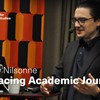sensible
Injunctive Versus Functional Inferences From Descriptive Norms Comment on Gelfand and Harrington
Journal of Cross-Cultural Psychology, 0022022115605387. Abstract Cialdini has argued that whereas injunctive norms motivate behavior by their promise of social sanctions, descriptive norms motivate beha
Thomas Sterner: Is there a climate crisis?
Thomas Sterner, Professor of Environmental Economics, Dept of Economics, University of Gothenburg The Guardian recently decided to change house style and start using terms like Climate Crisis instead o
The Oxford Handbook of Population Ethics - Interview with the editors
If we can affect how many people will be born in the future, what does that mean for our decisions today? Would it be bad if much fewer people would exist in the future, as an adaption to climate chan

Gustav Nilsonne: Pathways to an Open Science System. Replacing Academic Journals
Open science enables cumulative knowledge and facilitates discovery. The transition to an open science system is underway, but important roadblocks remain. A decentralised, evolvable network of platfo
An Ombudsman for Future Generations, Legitimate and Effective?
in: Institutions For Future Generations, Iñigo González-Ricoy and Axel Gosseries (red.), Oxford: Oxford University Press. 117-134. This chapter examines the possibility to establish ombudsmen as instr
Gustav Nilsonne: Pathways to an open science system: Replacing academic journals
Venue: Institutet för framtidsstudier, Holländargatan 13, 4th floor, Stockholm, and onlineREGISTERResearch seminar with Gustav Nilsonne, Associate Professor of neuroscience. He is active in meta-sciencOpen science enables cumulative knowledge and facilitates discovery. The transition to an open science system is underway, but important roadblocks remain. A decentralised, evolvable network of platforms interconnected by open standards, and governed by the scientific community, is technically feasible. However, academic researchers remain tied to traditional journals not least because assessment of merit is tied to the venue of publication. Ways forward can include redirection of funding from legacy publishing models to new infrastructure and the development of new methods to assess scientific contributions. Concerted action by stakeholders needs to be combined with pluralistic experimentation on policies and interventions to further open science practices.
Democratic Legitimacy, Institutions for Future Generations and the Problem of Constitutional Power
Chapter in Hélène Ruiz Valérie Rosoux Alessandra Donati (red.), Representing the Absent, Baden-Baden: Nomos Verlag. Find the full book here > Abstract Recognising widely held concerns regarding ‘presentchapter challenges the contention that democratic legitimacy inexorably requires the inclusion of futuregenerations in democratic decisions. According to two requirements of democratic legitimacy – inclusionand constitutional empowerment – people should be empowered to participate in decisions about policyand law, and to determine the rules structuring the political framework. Drawing a distinction betweenthese requirements, this chapter contends that though it may be feasible to ‘include’ future generations forproxy representation, future generations cannot enjoy ‘constitutional power’.
Lukas H. Meyer: Fairness is most relevant for country shares of the remaining carbon budget
Lukas H. Meyer, Professor of Philosophy at the University of Graz, Austria, and Speaker of the Field of Excellence Climate Change Graz, the Doctoral Programme Climate Change, and the Working Unit MoraIn my talk I argue that fairness concerns are decisive for eventual cumulative emission allocations shown in terms of quantified national shares.I will show that major fairness concerns are quantitatively critical for the allocation of the global carbon budget across countries. The budget is limited by the aim of staying well below 2°C. Minimal fairness requirements include securing basic needs, attributing historical responsibility for past emissions, accounting for benefits from past emissions, and not exceeding countries’ societally feasible emission reduction rate. The argument in favor of taking into account these fairness concerns reflects a critique of both simple equality and staged approaches, the former demanding the equal-per-capita distribution from now on, the latter preserving the inequality of the status-quo levels of emissions for the transformation period. I argue that the overall most plausible approach is a four-fold qualified version of the equal-per-capita view that incorporates the legitimate reasons for grandfathering.
Ole F. Norheim: Halving premature death by 2050: ethical issues
Venue: Institute for Futures Studies, Holländargatan 13 in Stockholm or online Research seminar with Ole F. Norheim, Mary B. Saltonstall Professor of Ethics and Population Health at Harvard T.H. Chan Sc

Studies on climate ethics and future generations vol 1
Working reports 2019 nr 1–11. Paul Bowman & Katharina Berndt Rasmussen (eds) There is a very rich scientific literature on different emission pathways and the climatic changes associated with them.








